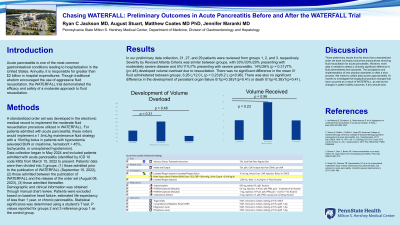Monday Poster Session
Category: Biliary/Pancreas
P1781 - Chasing WATERFALL: Preliminary Outcomes in Acute Pancreatitis Before and After the WATERFALL Trial
Monday, October 28, 2024
10:30 AM - 4:00 PM ET
Location: Exhibit Hall E

Has Audio
- RJ
Ryan C. Jackson, MD
Penn State Health Milton S. Hershey Medical Center
Hershey, PA
Presenting Author(s)
Ryan C. Jackson, MD1, August Stuart, BA, MS1, Matthew Coates, MD, PhD1, Jennifer Maranki, MD2
1Penn State Health Milton S. Hershey Medical Center, Hershey, PA; 2Penn State College of Medicine, Hershey, PA
Introduction: Acute pancreatitis is one of the most common gastrointestinal conditions leading to hospitalization in the United States. Annually, it is responsible for greater than $2 billion in hospital expenditures. Though traditional wisdom encouraged the use of aggressive fluid resuscitation, the WATERFALL trial demonstrated the efficacy and safety of a moderate approach to fluid resuscitation.
Methods: A standardized order set was developed in the electronic medical record to implement the moderate fluid resuscitation procedure utilized in WATERFALL. For patients admitted with acute pancreatitis, these orders would implement a 1.5mL/kg maintenance fluid strategy with a 10ml/kg bolus in patients with hypovolemia (elevated BUN or creatinine, hematocrit > 45%, tachycardia, or unexplained hypotension).
Data collection began in May 2024 and included patients admitted with acute pancreatitis (identified by ICD 10 code K85) from March 15, 2022 to present. Patients’ data were then divided into 3 groups: (1) those admitted prior to the publication of WATERFALL (September 15, 2022), (2) those admitted between the publication of WATERFALL and the release of the order set (August 08, 2023), (3) those admitted thereafter.
Demographic and clinical information was obtained through manual chart review. Patients were excluded based on baseline heart failure, estimated life expectancy of less than 1 year, or chronic pancreatitis. Statistical significance was determined using a student’s T test. P values reported for groups 2 and 3 reference group 1 as the control group.
Results: In our preliminary data collection, 21, 27, and 29 patients were reviewed from groups 1, 2, and 3, respectively. Severity by Revised Atlanta Criteria was similar between groups, with 33%/33%/20% presenting with moderately severe disease and 5%/11%/7% presenting with severe pancreatitis. 14%/26% (p = 0.31)/7% (p=.48) developed volume overload due to resuscitation. There was no significant difference in the mean IV fluid administered between groups, 6.26 L/12.0 L (p = 0.23)/6.2 L (p=0.96). There was also no significant difference in the development of persistent organ failure 0/1(p=0.38)/1(p=0.41) or death 0/1(p=0.38)/1(p=0.41).
Discussion: These preliminary results show that a standardized order set does not impact outcomes among those receiving fluid resuscitation for acute pancreatitis. However, more data is needed to detect a clinically significant difference in fluid administered and outcomes.
Disclosures:
Ryan C. Jackson, MD1, August Stuart, BA, MS1, Matthew Coates, MD, PhD1, Jennifer Maranki, MD2. P1781 - Chasing WATERFALL: Preliminary Outcomes in Acute Pancreatitis Before and After the WATERFALL Trial, ACG 2024 Annual Scientific Meeting Abstracts. Philadelphia, PA: American College of Gastroenterology.
1Penn State Health Milton S. Hershey Medical Center, Hershey, PA; 2Penn State College of Medicine, Hershey, PA
Introduction: Acute pancreatitis is one of the most common gastrointestinal conditions leading to hospitalization in the United States. Annually, it is responsible for greater than $2 billion in hospital expenditures. Though traditional wisdom encouraged the use of aggressive fluid resuscitation, the WATERFALL trial demonstrated the efficacy and safety of a moderate approach to fluid resuscitation.
Methods: A standardized order set was developed in the electronic medical record to implement the moderate fluid resuscitation procedure utilized in WATERFALL. For patients admitted with acute pancreatitis, these orders would implement a 1.5mL/kg maintenance fluid strategy with a 10ml/kg bolus in patients with hypovolemia (elevated BUN or creatinine, hematocrit > 45%, tachycardia, or unexplained hypotension).
Data collection began in May 2024 and included patients admitted with acute pancreatitis (identified by ICD 10 code K85) from March 15, 2022 to present. Patients’ data were then divided into 3 groups: (1) those admitted prior to the publication of WATERFALL (September 15, 2022), (2) those admitted between the publication of WATERFALL and the release of the order set (August 08, 2023), (3) those admitted thereafter.
Demographic and clinical information was obtained through manual chart review. Patients were excluded based on baseline heart failure, estimated life expectancy of less than 1 year, or chronic pancreatitis. Statistical significance was determined using a student’s T test. P values reported for groups 2 and 3 reference group 1 as the control group.
Results: In our preliminary data collection, 21, 27, and 29 patients were reviewed from groups 1, 2, and 3, respectively. Severity by Revised Atlanta Criteria was similar between groups, with 33%/33%/20% presenting with moderately severe disease and 5%/11%/7% presenting with severe pancreatitis. 14%/26% (p = 0.31)/7% (p=.48) developed volume overload due to resuscitation. There was no significant difference in the mean IV fluid administered between groups, 6.26 L/12.0 L (p = 0.23)/6.2 L (p=0.96). There was also no significant difference in the development of persistent organ failure 0/1(p=0.38)/1(p=0.41) or death 0/1(p=0.38)/1(p=0.41).
Discussion: These preliminary results show that a standardized order set does not impact outcomes among those receiving fluid resuscitation for acute pancreatitis. However, more data is needed to detect a clinically significant difference in fluid administered and outcomes.
Disclosures:
Ryan Jackson indicated no relevant financial relationships.
August Stuart indicated no relevant financial relationships.
Matthew Coates indicated no relevant financial relationships.
Jennifer Maranki indicated no relevant financial relationships.
Ryan C. Jackson, MD1, August Stuart, BA, MS1, Matthew Coates, MD, PhD1, Jennifer Maranki, MD2. P1781 - Chasing WATERFALL: Preliminary Outcomes in Acute Pancreatitis Before and After the WATERFALL Trial, ACG 2024 Annual Scientific Meeting Abstracts. Philadelphia, PA: American College of Gastroenterology.
